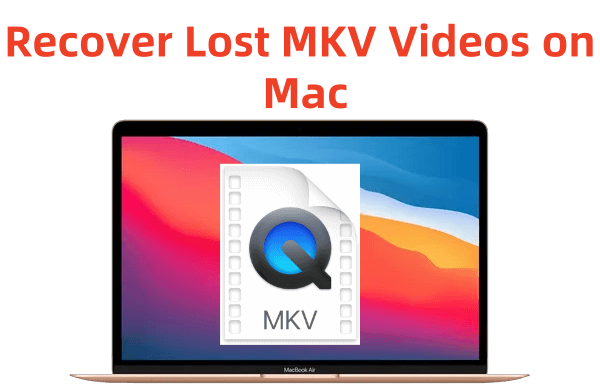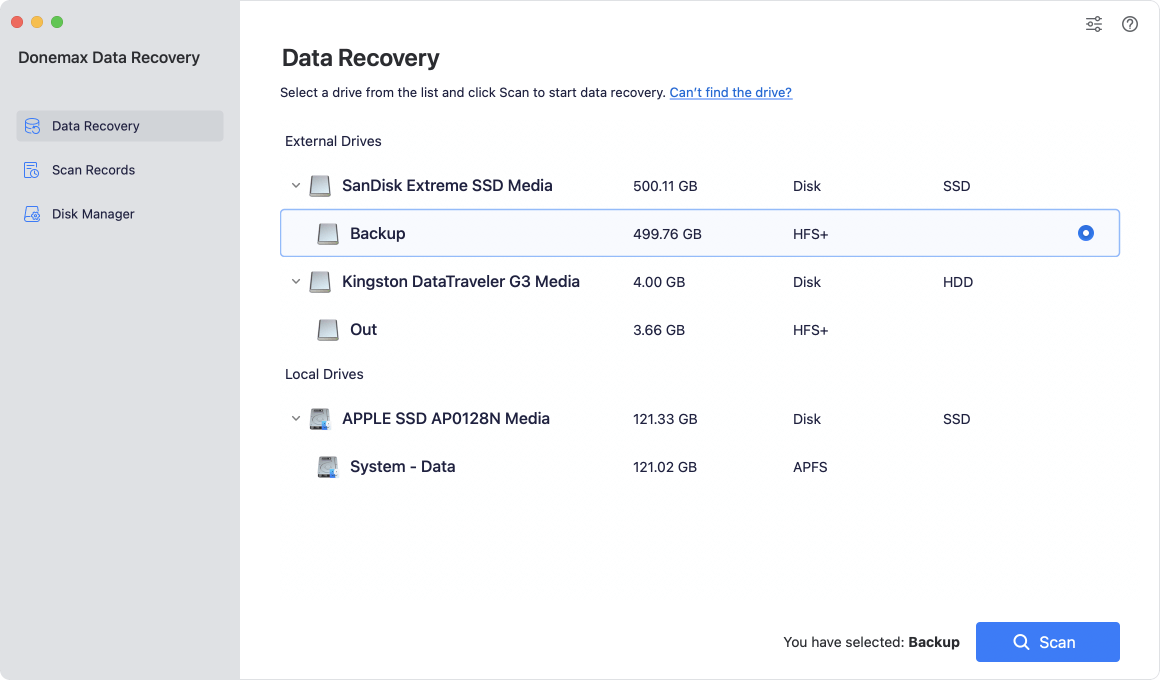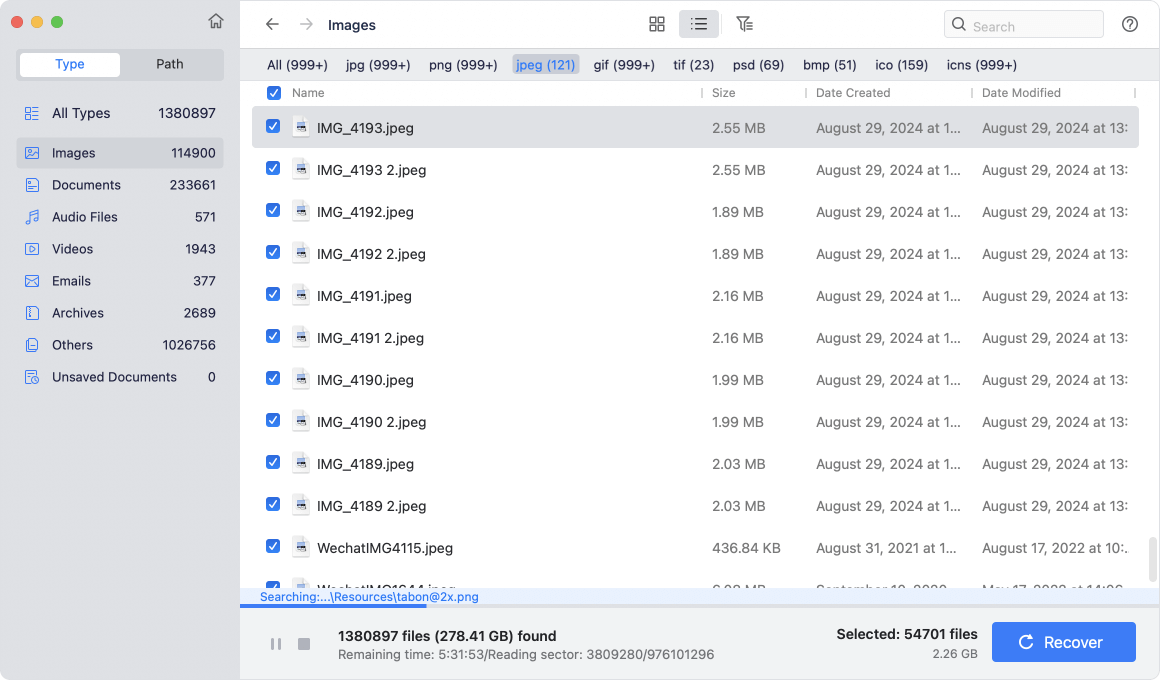PAGE CONTENT:
MKV files, also known as Matroska Video files, are a popular container format used to store high-definition multimedia content such as movies, series, or large video projects. Due to their high quality and versatility, they are commonly used by media enthusiasts, content creators, and video editors. However, just like any other file type, MKV files can be lost due to accidental deletion, formatting, software corruption, or unexpected system errors on a Mac.
If you've lost important MKV files on your Mac, don't panic. In many cases, they can be recovered successfully - especially if you act quickly and follow the right methods. This guide will walk you through how to recover lost MKV files on Mac using several proven techniques.

Common Causes of MKV File Loss on Mac
Prior moving into recovery methods, it is beneficial to understand why MKV files may disappear. Some of the most common causes include:
1. Accidental Deletion
This is one of the most common reasons. You might have selected the wrong file or folder and sent it to the Trash, or you could have used Command + Delete (or emptied the Trash) before realizing what you lost.
2. Formatting of Drive or Partition
Formatting an external drive, USB stick, or even a partition on your Mac without backing up can lead to a complete loss of all files, including MKV videos.
3. macOS Update or Crash
Sometimes, updating macOS or encountering a system crash can result in file system corruption or disappearance of certain files due to unexpected shutdowns.
4. Drive Corruption
A damaged or corrupted drive due to bad sectors or logical errors can render MKV files inaccessible or cause them to vanish altogether.
5. Malware or Third-Party App Conflicts
Though less common on macOS, malware or faulty applications can interfere with file storage or mistakenly delete video files.
Can MKV Files Be Recovered on Mac?
Yes, in many cases, MKV files can be recovered on a Mac, especially if the storage space where they were located hasn't been overwritten. When a file is deleted, the system marks the space as available, but the actual data remains intact until new data is written over it.
This makes it crucial to stop using the affected drive or partition immediately after discovering the loss. The sooner you act, the higher your chances of successful recovery.
4 Methods to Recover Lost MKV Files on Mac
Method 1: Recover MKV Files from Mac Trash
The first place to check is the Trash folder. If your MKV files were recently deleted, they may still be there.
Steps:
- Open the Trash from the Dock.
- Look for your MKV files (use the search bar if necessary).
- Right-click the file and choose Put Back to restore it to its original location.
![Recover MKV Files from Mac Trash]()
If you don't see the files there, they may have been permanently deleted or the Trash was emptied. Move on to other recovery methods.
Method 2: Use Time Machine Backup to Restore MKV Files
Time Machine is macOS's built-in backup tool. If you've set it up, you can restore deleted or lost MKV files from a backup point.
Steps:
- Attach the backup drive for your time machine.
- Access the folder containing the MKV files.
- Choose Enter Time Machine or Browse Time Machine Backups after clicking the Time Machine symbol in the navigation bar.
![Use Time Machine Backup to Restore MKV Files]()
- To access a date prior to the loss of the files, use the timeline on the right.
- Locate the MKV files, select them, and click Restore.
![Use Time Machine Backup to Restore MKV Files]()
Note: If you haven't enabled Time Machine or there is no backup, proceed to the next solution.
Method 3: Recover MKV Files with Data Recovery Software
When you can't find the MKV files in the Trash or Time Machine, the most effective solution is to use Mac data recovery software. These tools are capable of scanning your disk for deleted, lost, or even corrupted files and restoring them.
Donemax Data Recovery for Mac is one of the best Mac data recovery software. It supports to easily and completely recover lost files on Mac including deleted or lost MKV video files.
Here's how to use one of them (e.g., Donemax Data Recovery for Mac):
Steps:
Step 1. Download and install Donemax Data Recovery for Mac, then run it from Launchpad.
Step 2. Open Donemax Data Recovery for Mac, then select the drive where you delete or lost the MKV files.

Step 3. Click on Scan button to deeply scan the drive and find all recoverable files including MKV files.

Step 4. After the scan, filter the results by Video file type or use the search bar to type .mkv. Preview the MKV files (if available), then select and click Recover.

Save the files to a different location (not the original drive).
Important Tips:
- Do not install the recovery software on the same drive you're recovering from.
- Preview files before recovery to ensure they're intact.
- If your drive was formatted, deep scanning may be needed.
What If the MKV File Is Corrupted?
Sometimes, even after recovery, MKV files might not play due to partial corruption. This can happen if the file was only partially overwritten or the header was damaged. In such cases:
- Use VLC Media Player to try and repair the MKV file (it often fixes damaged video streams).
- Use specialized tools like Meteorite MKV Repair or Stellar Video Repair for severe corruption.
Bonus Tip: Recovering MKV Files from External Devices
MKV files are often stored on external devices like USB drives, portable SSDs, or SD cards. If you lost files from such a device, you can recover them by:
- Connecting the device to your Mac using a reliable cable or adapter.
- Launching your recovery software (e.g., Donemax Data Recovery for Mac).
- Selecting the external device from the drive list.
- Following the same recovery process as described above.
If the external drive doesn't show up: Use Disk Utility to see if it's recognized at the hardware level. You may need to mount it manually or try another USB port.
Method 4: Restore from Cloud Storage or External Backup
If you regularly back up files to the cloud or an external drive, you might be able to restore MKV files easily.
Check These Services:
- iCloud Drive: Open Finder > iCloud Drive > Check for MKV files.
- Google Drive: Visit drive.google.com, sign in, and search your storage.
- Dropbox, OneDrive, or Mega: Use the corresponding app or website to check your synced files.
Also check external backup drives, USB flash drives, or NAS storage you may have used previously.
Advanced Tips: Terminal-Based File Recovery (Optional)
For technically savvy users, you can attempt to recover deleted MKV files using macOS Terminal with tools like testdisk or PhotoRec. These are open-source and free, though they require command-line knowledge.
Example steps (for PhotoRec):
- Install Homebrew:
/bin/bash -c "$(curl -fsSL https://raw.githubusercontent.com/Homebrew/install/HEAD/install.sh)"
- Install PhotoRec:
brew install testdisk
- Run PhotoRec:
sudo photorec
- Follow the interactive prompts to select the disk and recover video files.
Note: These tools can be powerful but have a steeper learning curve. Use with caution.
Tips to Increase Mac MKV File Recovery Success
The success of file recovery often depends on the actions you take immediately after data loss. Follow these best practices:
1. Stop Using the Affected Drive
Any new file you save could overwrite the deleted MKV files. This is especially critical for internal SSDs and external USB drives.
2. Do Not Format the Drive Again
Avoid reformatting or reinitializing the disk until recovery is complete.
3. Avoid Installing New Apps or Tools
Installing recovery software to the same disk could overwrite lost data. Use another partition or external drive.
4. Use File Filters
Recovery tools allow you to filter by file type. Use the .mkv extension to quickly locate and recover relevant video files.
How to Prevent MKV File Loss on Mac in the Future?
While recovery is often possible, prevention is always better. Here's how you can safeguard your video files going forward:
1. Enable Time Machine
Set up Time Machine for automatic backups to an external drive. It provides peace of mind and easy recovery.
2. Use Cloud Storage
Services like iCloud, Google Drive, or Dropbox offer real-time syncing, version control, and backup redundancy.
3. Back Up External Drives
Don't store all your MKV files solely on external drives. These are vulnerable to failure, corruption, or accidental formatting.
4. Use Reliable Media Players
Stick to reputable apps like VLC or IINA for playing MKV files. Avoid obscure or unverified software that may corrupt video files.
5. Avoid Unsafe Eject or Power Loss
Always eject USB drives and external SSDs safely before removing them. Power loss during file transfer can cause corruption.
6. Use Antivirus Software
macOS is fairly secure, but adding an antivirus tool helps detect threats that could compromise or delete files.
Conclusion
Losing valuable MKV files on your Mac can be frustrating, especially if they contain cherished memories, downloaded movies, or important video projects. Fortunately, with the right methods, most of these files can be recovered - provided you act quickly and avoid overwriting the lost data.
To summarize:
- First, check the Trash.
- Try Time Machine or cloud backups if available.
- Use a reputable data recovery software for deep scans.
- Restore from external or cloud backups.
- Follow best practices to avoid data loss in the future.
By staying calm and following this guide, you can greatly increase your chances of successfully recovering lost MKV files on your Mac and ensure better protection against future data loss.


Donemax Data Recovery for Mac
Donemax Data Recovery for Mac is one of the best Mac data recovery software. It is easy-to-use and can help in recovering deleted, formatted, inaccessible or lost data from Mac HDD/SSD, external disk, USB drive, SD card, camera or other storage devices.
Related Articles
- Mar 26, 2025How to Recover Deleted .dmg File on Mac? [7 Methods]
- Apr 18, 2025How to Recover Lost SR2 File on Mac – A Comprehensive Guide
- Apr 06, 2025How to Recover Deleted Apps on Mac? [5 Methods]
- Jul 12, 2024How to Recover Lost Data from Unmounted Drive on Mac?
- Apr 22, 2025TestDisk Deleted / Lost Partition Recovery on Mac
- Dec 25, 2025How to Restore Mac from Time Machine Backup?

Steven
Steven has been a senior writer & editor of Donemax software since 2020. He's a super nerd and can't imagine the life without a computer. Over 6 years of experience of writing technical solutions and software tesing, he is passionate about providing solutions and tips for Windows and Mac users.

Gerhard Chou
In order to effectively solve the problems for our customers, every article and troubleshooting solution published on our website has been strictly tested and practiced. Our editors love researching and using computers and testing software, and are willing to help computer users with their problems


